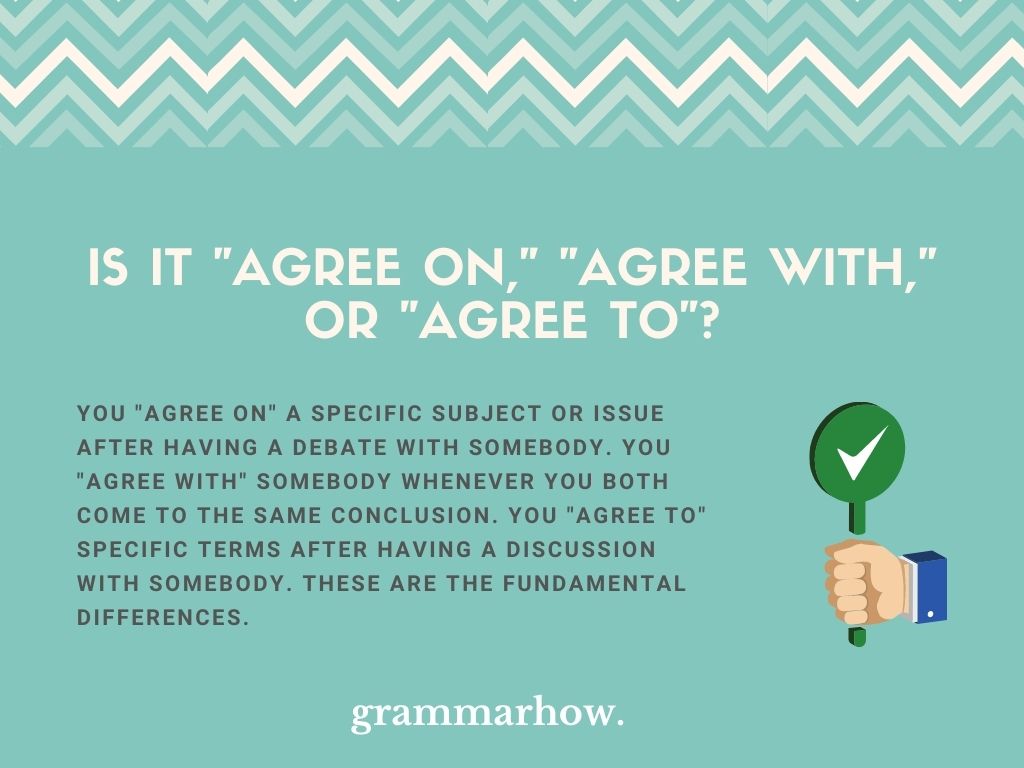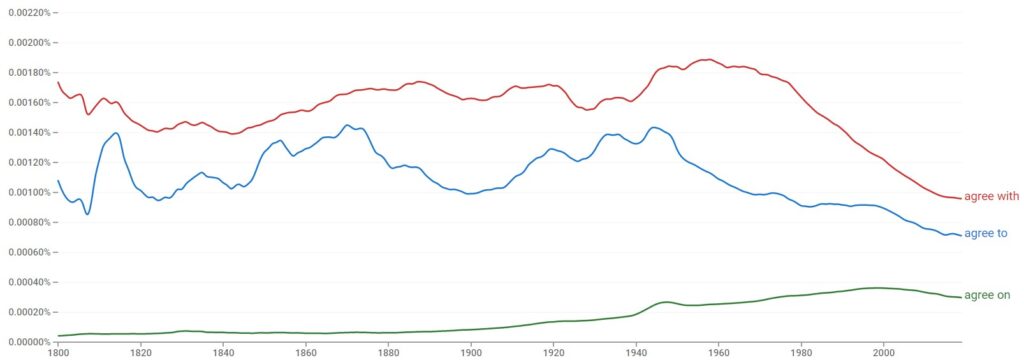The prepositions that come after “agree” mainly depend on the context we’re using. “Agree on,” “agree with,” and “agree to” are all correct. This article will explore when each variation works best so you have a better understanding of it in the future.
Is It “Agree On,” “Agree With,” Or “Agree To”?
You “agree on” a specific subject or issue after having a debate with somebody. You “agree with” somebody whenever you both come to the same conclusion. You “agree to” specific terms after having a discussion with somebody. These are the fundamental differences.

The three phrases are not interchangeable. You need to make sure you understand the full meaning behind each prepositional choice.
These examples will demonstrate how each one works:
- I agree on the subject of choice between these parties.
- I agree with Tom about this.
- I agree to the terms, and I think we can move to the next subject.
What Does “Agree On” Mean?
Let’s start by defining them more individually.
“Agree on” works when we want to talk about a specific subject. We usually announce what the subject is directly after using “agree on” to show how we share the same views in the debate as somebody else.
“Agree on” works best once someone else has put their views forward. We cannot “agree on” something if nobody has spoken about their views yet.
- I agree on all counts except for the last one. I think there is something more we can do about this.
- I do not agree on the same points, but I’m sure we can come to some kind of arrangement.
- She didn’t agree on this point, so we need to make sure we proceed with caution around her.
- If you are going to agree on the matter, you’ll want to make sure you make your stance abundantly clear.
- I agree on all points except for the one that affects us the most!
What Does “Agree With” Mean?
“Agree with” works in many cases to agree with people or things. It means that you accept whatever someone said or the thing that someone might have been talking about. It’s one of the most common “agree” forms we can use.
- I did not agree with you at first, but you’ve managed to convince me with some of the things you said.
- If you want to agree with him, you really should try and find some common ground to work through.
- I thought you would agree with me! That’s why I was coming to you for help with this situation.
- I agree with you! Don’t worry! You’re not alone in this, and I’m sure we can think of some way to get through it.
- If you’re not going to agree with him, then there isn’t much of a point in you being here for this meeting!
What Does “Agree To” Mean?
“Agree to” means that you accept responsibility for something. You usually have to sign something to show that you agree with whatever is presented to you. Once you “agree to” them, there is often no way to take your agreement back.
- Did I agree to the terms? No. I didn’t. You have to give me more time to think.
- I’m not going to agree to anything that doesn’t suit my needs, so you don’t have to worry about me being reckless.
- If you agree to this contract, you have to make sure you’re certain you know what you’re signing up for.
- If you agree to the things laid out before you, we’ll make sure to give you a much easier life after this point.
- Stop agreeing to everything they give you! It’s not a good look, and it’s really bad for business!
Is “Agree On,” “Agree With,” Or “Agree To” Used The Most?
According to Google Ngram Viewer, “agree with” is the most popular choice of the three. “Agree to” seems to be second-most popular, and “agree on” is the least popular.

Clearly, all three are commonly used. However, “agree with” is the most common because it’s the one that applies to most contexts in English. You can agree with people and things, which is why most people would rather use this phrase.
Is It Correct To Use “Agree” Without A Preposition?
“Agree” can be used without a preposition in many cases. If we are simply making a statement that we do not agree about something, we do not always need to elaborate. It’s common for “agree” to come without a preposition when it is one of the only words used.
These short examples will explain more about what we mean by this:
- I agree.
- I did not agree.
- You do not have to agree.
- I thought we could agree.
- There is no reason to agree.
Which Other Prepositions Can Be Used After “Agree”?
Finally, let’s go over some other prepositions we can use with “agree.” They all come after the verb, but we’ll demonstrate some of the other ones now.
Agree About
“Agree about” works when we are giving a specific subject or point of discussion. It’s identical to “agree on,” but “agree about” is a much less common variation.
- We did not agree about the things we said in that meeting.
- You should agree about the subject choice.
Agree That
“Agree that” works when we want to explain what we agree to after the fact. We can use it to reiterate someone else’s point to show that we agree with what they said.
- I agree that something needs to be done about this.
- I agree that Sam’s words were not ideal.
Agree Upon
“Agree upon” is identical to “agree on.” We use “upon” in rare circumstances because it’s a more archaic form of “on” as a preposition. Nevertheless, it is still grammatically correct, so feel free to use it if you like the way it works.
- We did not agree upon the matter, and I think there is plenty more for us to discuss.
- Let’s agree upon something else while we wait for another party to join us!
You may also like: “Agreed” or “Agree” – Difference Explained (With Examples)

Martin holds a Master’s degree in Finance and International Business. He has six years of experience in professional communication with clients, executives, and colleagues. Furthermore, he has teaching experience from Aarhus University. Martin has been featured as an expert in communication and teaching on Forbes and Shopify. Read more about Martin here.

